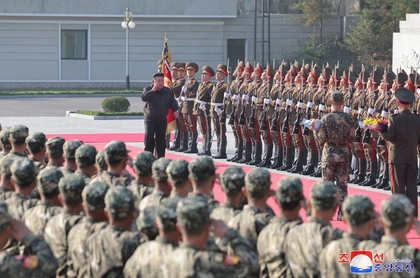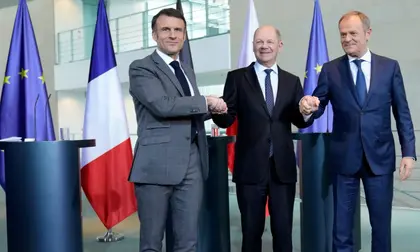Following a meeting in Berlin, French President Emmanuel Macron, German Chancellor Olaf Scholz and Polish Prime Minister Donald Tusk made a show of unity and announced the joint procurement of more weapons for Ukraine. Europe's press looks hopefully to this three-country format, which has been dubbed the "Weimar Triangle" since a meeting of foreign ministers in the central German city of Weimar in 1991.
Concrete progress
The Romanian service of Radio France International points to constructive concessions by Paris and Berlin:
JOIN US ON TELEGRAM
Follow our coverage of the war on the @Kyivpost_official.
“Remarkably, the three leaders have concluded that they must seek military equipment for Ukraine all over the world, overriding President Macron's earlier position that the weapons should come from Europe. Another change is that the three have decided to expand arms production and use profits from frozen Russian assets to finance equipment purchases - a departure from a previous Berlin position.”
Founding moment of a new Europe
Tygodnik Powszechny sees a historic turning point:
“The joint visit of the Polish president and prime minister to the US and the meeting of the Weimar Triangle are elements of a much larger whole. We are at a turning point. ... Europe has struck out in a strategic direction. Even if not in its entirety (Orbán will likely continue to make waves), and even if not without internal strife (think of Germany). Perhaps one day historians will write that the spring of 2024 was not just another turning point in this war but the founding moment of Europe as an assertive political force that is prepared to defend its ideas with weapons.”

North Korea UN Representative Denies Pyongyang Sent Troops to Russia
Bring post-Putin Russia back into the fold
The European trio may soon face major challenges, Le Figaro points out:
“If Trump returns to the White House in January 2025 and no longer shows any interest in European affairs, the Paris-Berlin-Warsaw axis will become even more important. Does this mean that the Weimar Triangle sees itself as fundamentally anti-Russian? Certainly not. Emmanuel Macron has emphasised that the Russian people are not our enemy. The European ambition is certainly not to drive them into the arms of China, which would be a cardinal strategic error. In the long term, once Putin is gone, the goal will be to secure this important nation within the structure of the European family, namely the rule of law.”
Meeting symbolises unity
Le Soir sees the meeting as an important signal:
“After the Berlin summit, much remains to be done to oppose this 'Putin über alles' with a united European front that is capable defeating him or remaining steadfast if, by some misfortune, the Russian dictator emerges victorious from his war against Ukraine. But after President Macron's recent solo action and the tensions between France and Germany, the handshake between the three leaders of Germany, France and Poland on Friday gave new life to European unity, which is vital in the current trial of strength.”
You can also highlight the text and press Ctrl + Enter






